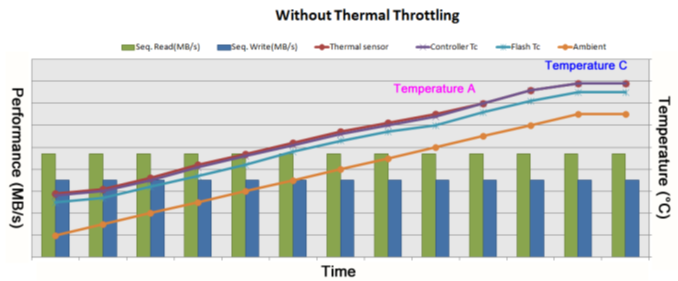Flash Storage Solutions for Embedded Designs
High Reliability Flash SSDs, Cards and Modules for Industrial Applications

 Posted by Samuel Nakhimovsky on Tuesday, 07 Jul 2020
Posted by Samuel Nakhimovsky on Tuesday, 07 Jul 2020
Solid-state drives (SSDs) are a type of data storage device that use a non-volatile semiconductor-based memory, such as a flash memory, to store data. As market demand for high capacity storage drives higher and higher SSD capacity, performance demands increase respectively. To achieve an increase in SSD performance, multiple storage components need to be addressed simultaneously, increasing the power usage by the SSD. At the same time, the physical size requirements of the SSD generally stay the same or become even smaller.
When SSDs are subjected to sustained workloads from peak performance sequential writes over a long period of time, the drives tend to internally heat up. If and when the SSD temperature exceeds that of the rated operating conditions, the NAND Flash components start to "leak" electrons and data errors are very likely to occur. In addition, to compound the problem, SSDs used in industrial applications must be able to tolerate higher ambient temperatures, which naturally hinders heat dissipation. This temperature increase can potentially put data stored on the SSD at the risk of being corrupted and hardware components in danger of being permanently damaged, both of which, naturally, lead to significant reduction in the life expectancy of the drive.
Here is a chart for SSD continuous operation without any cooling techniques.

To address this problem, Fortasa current generation SSD products are designed with a built-in thermal sensor to monitor the temperature of the SSD. Additionally, the Flash Controller Firmware utilizes this real time temperature measurement data to automatically reduce the drive performance when the internal SSD temperature exceeds the device rated performance threshold. This feature reduces the drive performance which allows for SSD self-cooling and this, in-turn, increases SSD's reliability and prolongs product's lifespan.
The thermal management technique presented in this article can be applied to any thermal-sensor-equipped SSD, whether it supports Standard-grade temperature operating ranges (0°C to 70°C) or Industrial-grade temperature operating ranges (-40°C to 85°C).